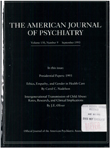Anxiety syndromes as epiphenomena of primary major depression: outcome and familial psychopathology
Abstract
OBJECTIVE: Anxiety symptoms often appear within depressive episodes, but their significance is uncertain. This study sought to determine whether they indicate the coexistence of a separate disease process and whether they have prognostic significance. METHOD: A series of patients with primary depression who entered a follow-up and family study included 37 who also had obsessions or compulsions, 93 who had panic attacks, 101 who had phobias, and 196 who had none of these anxiety syndromes. Each of the overlapping groups defined by the presence of a specific anxiety syndrome was compared to the group that had none of these syndromes with respect to baseline demographic, phenomenological, and historical features, illness rates among directly interviewed relatives, and diagnostic stability and clinical outcome at semiannual follow-ups over a period of 5 years. RESULTS: Depressive symptoms at intake were more longstanding and severe among patients with specific anxiety symptoms, and these patients went on to experience more depressive morbidity during the ensuing 5 years. The development of autonomous anxiety disorders was rare, however, and specific anxiety syndromes in the probands did not increase risks for the corresponding disorders among relatives. CONCLUSIONS: When restricted to episodes of major depression, anxiety syndromes appear to be prognostically significant epiphenomena rather than indicators of an additional disorder.
Access content
To read the fulltext, please use one of the options below to sign in or purchase access.- Personal login
- Institutional Login
- Sign in via OpenAthens
- Register for access
-
Please login/register if you wish to pair your device and check access availability.
Not a subscriber?
PsychiatryOnline subscription options offer access to the DSM-5 library, books, journals, CME, and patient resources. This all-in-one virtual library provides psychiatrists and mental health professionals with key resources for diagnosis, treatment, research, and professional development.
Need more help? PsychiatryOnline Customer Service may be reached by emailing [email protected] or by calling 800-368-5777 (in the U.S.) or 703-907-7322 (outside the U.S.).



